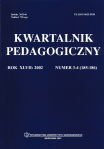DZIECIĘCE FILOZOFOWANIE (I FILOZOFOWANIE Z DZIEĆMI) JAKO ZASADA PRACY Z UCZNIEM
CHILDREN’S PHILOSOPHIZING (AND PHILOSOPHIZING WITH CHILDREN) AS A PRINCIPLE IN EDUCATION
Author(s): Maria Szczepska-PustkowskaSubject(s): Education
Published by: Wydawnictwa Uniwersytetu Warszawskiego
Keywords: filozofia dla dzieci; dziecięce filozofowanie; filozofowanie z dziećmi
Summary/Abstract: We tend to ignore children’s questions (utterances) or remember them as funny anecdotes that show how naive and immature their perception is. But while some smile indulgently, others analyse the subject thoroughly. The underlying principle here is the author’s trust in children’s receptive skills and respect for their openness towards all that surrounds them, in their capacity for surprise in face of the world, in their readiness and will to learn and understand the world. This text is, hence, devoted to children’s philosophizing that is understood here in two ways. The first is a natural child’s tendency to formulate philosophical questions originating from astonishment with the view of the world. The second is philosophizing with children within inquiring community, for instance a class. A child’s tendency to be amused by the world and ask about it is the “natural richness” that should be noticed and appreciated, but above all cherished and developed by education (in the meantime it is discouraged by it very often). Childhood is presented here as a period of progressing and building of a child’s intellectual potential, at the same time being the period of constant exploring and discovering the world (that is neither simple, nor obvious or synonymous); the period of astonishment with the world and numerous doubts and, as a consequence, a period of many rising questions. From such a point of view, an answer to a question about how? a child thinks (interest lies in the core and structure of child’s reception processes) should not interfere with a question what? it thinks (interest lies in the content of formulated statements). According to this fact, the arguments implying children’s philosophizing abilities should not be searched for only in theories of cognition, but also in results of qualitative analyses of the content of children’s questions and judgments of reality. The essential question in the paper is about the role of philosophy and philosophizing (“children’s” and “with children”) in education. The question raised complies with educational tendencies observed in the world. Philosophy (and philosophizing), which is understood mainly as a school of asking questions and thinking, becomes a place in which the child’s natural tendencies to give meaning to the world and the child’s place in it are used, developed and “administered”. From this point of view, they are an ideal starting point to discuss learning and knowledge, deliberate on school/class, observe, study and analyse teachers’ competence (as a child’s co-philosophizing partners present within the community). As well as they are a principle that pervades education “everywhere and ever” – a ground of certain particular generality, which education creates to fill up the shape and interior of the present.
Journal: Kwartalnik Pedagogiczny
- Issue Year: 211/2008
- Issue No: 1
- Page Range: 5-31
- Page Count: 27
- Language: Polish
- Content File-PDF

